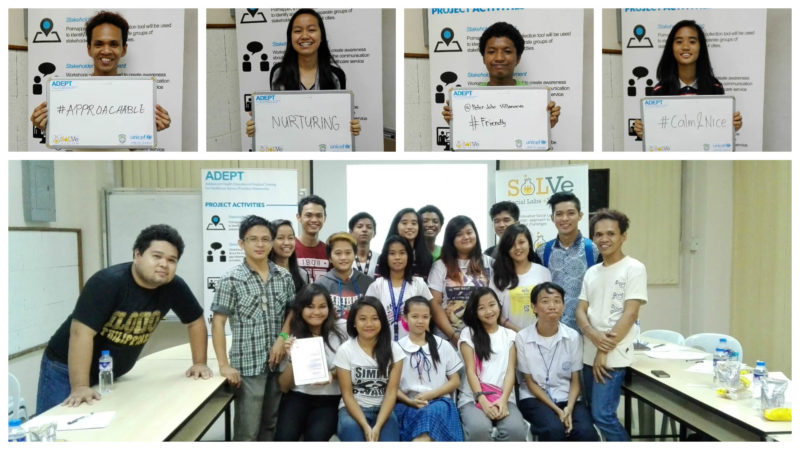
Adolescence is a critical time when the youth are interested in important issues such as reproductive health. However, engaging with them has proved to be a challenge for healthcare workers. ADEPT aims to bridge this communication gap by providing healthcare service providers in four key cities in the Visayas with an e-learning toolkit that they can access at their convenience. The one-year initiative equips healthcare workers to provide the youth with information on reproductive services available for them thus, enabling them to make informed decisions about their health and welfare.
ASSIST developed a video-based e-learning toolkit for healthcare professionals in Borongan, Iloilo, Roxas, and Tacloban. The platforms provided them with relevant healthcare data gathered from the conduct of stakeholder mapping. ADEPT also became a platform for youth groups and adolescent health care providers to interact and access resources on reproductive healthcare.
In developing the toolkit, ASSIST conducted: (1) Stakeholder Mapping to engage groups of key stakeholders in the project sites; (2) Stakeholder Engagement wherein one-day workshops were conducted in each of the cities to build awareness on the importance of adequate communication between healthcare professionals and the youth; (3) e-Learning Tool Design, Production and Launch wherein the development of the toolkit was based on the inputs from stakeholder consultations; and (4) Training of Trainers (ToT) Workshops where healthcare service providers were equipped in the application of the toolkit in their engagement with the youth.
In a bid to extend financial inclusion to remote areas in the Philippines, the CAN program of the Grameen Foundation aims to build a network of financial agents in rural villages of Panay Island. The project enabled sari-sari store owners, mostly stay-at-home mothers, to offer a range of financial services to their villages.
ASSIST developed two interactive, web-based e-learning courses to equip sari-sari store owners to become a financial agent which can be accessed through Android-based tablets. Course One teaches the owners to use the digital payment center device called Ka-Pos!ble!; and Course Two is an engaging, easy-to-understand module on encouraging financial literacy among micro-vendors who used digital payment devices called Digi-tindahan. ASSIST designed and developed the storyboard, script, graphics, animations, and videos for both the following courses.
The Department of Health (DOH), with the support of the World Health Organization – Philippines Country Office (WHO-PHL), led the development of a Manual of Operations for the Adolescent Health and Development Program. The Manual serves as a guide for program managers, coordinators and implementers in operationalizing the National Policy and Strategic Framework on Adolescent Health and Development (AHDP).
To enable the Department of Health to develop an appropriate, effective and sustainable adolescent health and development program, a manual of operations has been developed and ready for print layouts. ASSIST was contracted to provide the layout and design services for this publication. Aside from leading the creative design, ASSIST also reviewed relevant photos and conducted photo shoots to provide the publication with useful visuals,\ and closely coordinated with different DOH units and stakeholders for technical inputs.
China increased its economic power through a staggering expansion of heavy industry and urbanization in the past decade. A key city that experienced open industrial and commercial growth is Kunshan City, which aims to continue its industrial development and at the same time conserve its environment. AIM is a Private Sector Partnership (PSP) project jointly implemented by Vossloh, TÜV NORD, and ASSIST, and aims to improve the quality and environmental management systems in Vossloh’s supply chain in the Kunhan Industrial Estate in China thus, contributing to a more sustainable industrial system in China.
The AIM project was implemented in three key phases: 1. conduction of four one-day ISO 9001 and ISO 14001 awareness sessions; 2. technical assistance to five companies helping them align their practices with the above ISO standards; and 3. processing of the certification and the development of e-tools to assist this process. Three training of trainers (ToT) sessions were also conducted to qualify 60 local trainers and create a local pool of trainers on these international standards. A Body of Knowledge (BoK) document was also developed, benchmarking ISO 9001 and ISO 14001 standards in Chinese and English languages to build the local capacity.
The project raised awareness on these quality and environmental standards among companies in Kunshan City. E-newsletter and e-learning kits were developed and distributed along with the organisation of drawing and slogan writing competitions to educate companies and increase interest on the importance of Quality and Environmental Management Systems (QEMS).


